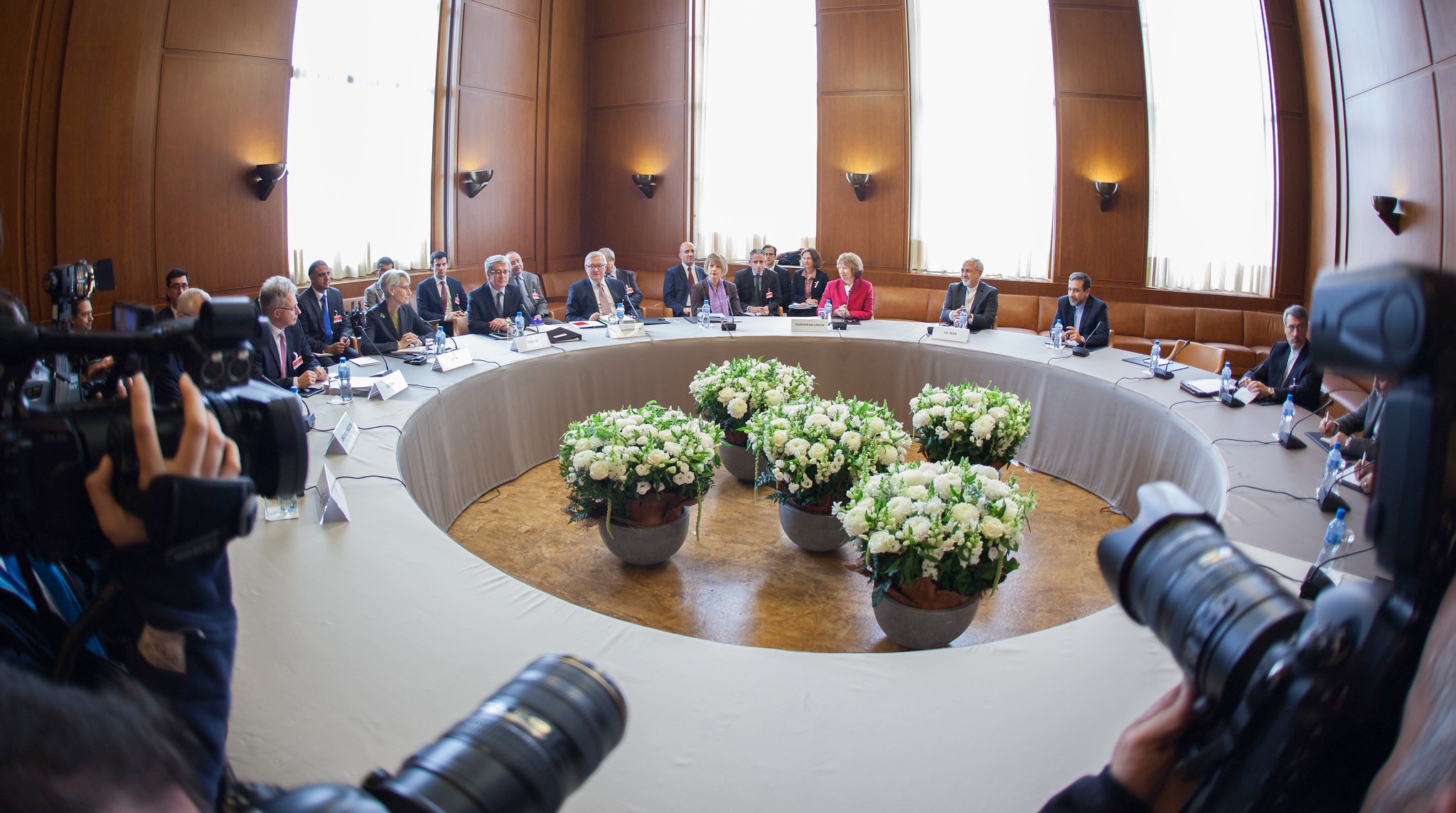 P5+1 talks on Iran's nuclear program. (U.S. Mission Geneva / Eric Bridiers)
P5+1 talks on Iran's nuclear program. (U.S. Mission Geneva / Eric Bridiers)
Assassination of a Top Iranian Nuclear Scientist: Is This the JCPOA’s Nuclear Fallout?
On Friday, November 27, one of Iran’s top nuclear scientists, Mohsen Fakhrizadeh, was assassinated near the city of Absard, about 40 miles east of Tehran. International news sources report that five or six gunmen showered Fakhrizadeh’s vehicle with bullets, while Iran claims that the vehicle was targeted via remote-controlled firearms and even an artificial intelligence-based “satellite-controlled smart system.” U.S. actions up to this point have already heavily endangered the possibility of a successful reimplementation of the Joint Comprehensive Plan of Action (JCPOA), and Iran’s incentives for coming back into compliance with the deal only grow smaller following Fakhrizadeh’s assassination, no matter the lack of attribution.
Who Was Mohsen Fakhrizadeh?
Fakhrizadeh was an Islamic Revolutionary Guard Corps (IRGC) brigadier general and a professor of physics at the IRGC’s Imam Hussein University. He served as the Executive Officer of the AMAD Plan, Iran’s military nuclear program, which formally ended in 2003. Fakhrizadeh has been on a U.S. State and Treasury sanctions list dating back to 2008 and a United Nations (UN) sanctions list since 2007. After the close of the AMAD Plan, Fakhrizadeh and his government-funded nuclear weapons research group, the Organization of Defensive Innovation and Research (SPND), were both scheduled to be removed from the sanctions lists in 2023 as part of the terms of the JCPOA.
A History of Assassinations
In a letter to the UN Secretary-General, Iran condemned the assassination as an “inhumane terrorist attack.” No one has claimed responsibility for the attack, which Iranian Foreign Minister Mohammad Javad Zarif called an “act of state terror” with “serious indications of [an] Israeli role.” Iranian officials have openly attributed the attack to Israel while vowing retaliation, while senior U.S. officials have also attributed the attack to Israel. Iran also attributes to Israel the deaths of four other nuclear scientists between 2010 and 2012, which includes the assassination of well-known Iranian nuclear scientist Majid Shahriari nearly ten years ago on November 29, 2010. Although Israel has not claimed responsibility for any of the attacks, both Israeli Prime Minister Benjamin Netanyahu and other top Israeli defense officials have repeatedly announced that Iran’s nuclear program must be stopped.
Adding Fuel to the Fire
The assassination feeds the fire of regional conflict and leaves Iranian officials on edge, especially those of the IRGC, given Fakhrizadeh’s status. The Iranian Minister of Defense Amir Hatami also pointed fingers at the United States, citing the drone strike assassination of Qassem Soleimani, a top IRGC general in January 2020. Both U.S. defense officials and the office of Netanyahu declined to comment on the incident. After the assassination of Soleimani, fears grew of a war between Iran and the United States. While the possibility of Iran escalating retaliatory measures into a conventional war is slim, Iran may take up increased cyber and gray-zone tactics against the United States as it has over the last few years.
Operational Impacts
The impacts of Fakhrizadeh’s death will be more political than they are practical. Iran’s nuclear program will likely remain strong, given its historical ability to bounce back from numerous past assassinations and the power of the nuclear program as a key element of its national objectives. However, Fakhrizadeh’s affiliation with Iran’s nuclear program — both the previously declared military program as well as the program in its current form — strikes a blow at the institutionalization of knowledge in the program. The ability to attack and successfully kill a top scientist also means that the nuclear program is vulnerable writ large, and this may act as a deterrent against other qualified scientists who could take the reins either practically or ideologically. The success of this attack also implicates possible holes in Iran’s security enterprise.
The Future of U.S.-Iran Relations
It’s up to Iran on whether it wants to issue a retaliatory strike like it did on U.S. bases in Iraq after the death of Soleimani, which, while killing none and limited in scope, sent a message that Iran felt compelled to respond. A retaliatory strike toward the U.S. in response to the killing of Fakhrizadeh — despite no clear evidence for attribution — could provide the Trump administration with a reason to escalate conflict in the time it has remaining. If Tehran wants to increase the chances of diplomatic success and sanctions relief with the incoming Biden administration, this would not be wise. Top U.S. officials reportedly dissuaded Trump from taking preemptive strikes against Iran’s nuclear sites, including Natanz, but this attack itself could preclude future diplomatic efforts from proceeding smoothly. Having the United States rejoin the JCPOA and renew diplomacy with Iran is at the top of President-elect Biden’s list of foreign policy priorities after President Trump’s departure from the agreement in 2018. However, disruptions and continued mistrust surrounding Iran’s nuclear program drive fears that the JCPOA will be officially dead come 2021. This assassination deals a significant blow to the diplomatic approach Biden is expected to take toward U.S.-Iran relations, no matter who actually carried out the attack, fueling a continued era of mistrust between Iran, Israel, and the United States.





